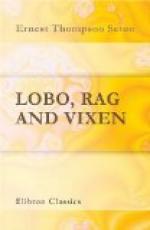It was now July, the Moon of Berries. The chicks had grown and flourished amazingly during this last month, and were now so large that in her efforts to cover them the mother was kept standing all night.
They took their daily dust-bath, but of late had changed to another higher on the hill. It was one in use by many different birds, and at first the mother disliked the idea of such a second-hand bath. But the dust was of such a fine, agreeable quality, and the children led the way with such enthusiasm, that she forgot her mistrust.
After a fortnight the little ones began to droop and she herself did not feel very well. They were always hungry, and though they ate enormously, they one and all grew thinner and thinner. The mother was the last to be affected. But when it came, it came as hard on her—a ravenous hunger, a feverish headache, and a wasting weakness. She never knew the cause. She could not know that the dust of the much-used dust-bath, that her true instinct taught her to mistrust at first, and now again to shun, was sown with parasitic worms, and that all of the family were infested.
No natural impulse is without a purpose. The mother-bird’s knowledge of healing was only to follow natural impulse. The eager, feverish craving for something, she knew not what, led her to eat, or try, everything that looked eatable and to seek the coolest woods. And there she found a deadly sumach laden with its poison fruit. A month ago she would have passed it by, but now she tried the unattractive berries. The acrid burning juice seemed to answer some strange demand of her body; she ate and ate, and all her family joined in the strange feast of physic. No human doctor could have hit it better; it proved a biting, drastic purge, the dreadful secret foe was downed, the danger passed. But not for all—Nature, the old nurse, had come too late for two of them. The weakest, by inexorable law, dropped out. Enfeebled by the disease, the remedy was too severe for them. They drank and drank by the stream, and next morning did not move when the others followed the mother. Strange vengeance was theirs now, for a skunk, the same that could have told where Runtie went, found and devoured their bodies and died of the poison they had eaten.
Seven little partridges now obeyed the mother’s call. Their individual characters were early shown and now developed fast. The weaklings were gone, but there was still a fool and a lazy one. The mother could not help caring for some more than for others, and her favorite was the biggest, he who once sat on the yellow chip for concealment. He was not only the biggest, strongest, and handsomest of the brood, the best of all, the most obedient. His mother’s warning ‘rrrrr’ (danger) did not always keep the others from a risky path or a doubtful food, but obedience seemed natural to him, and he never failed to respond to her soft ‘K-reet’ (Come), and of this obedience he reaped the reward, for his days were longest in the land.




